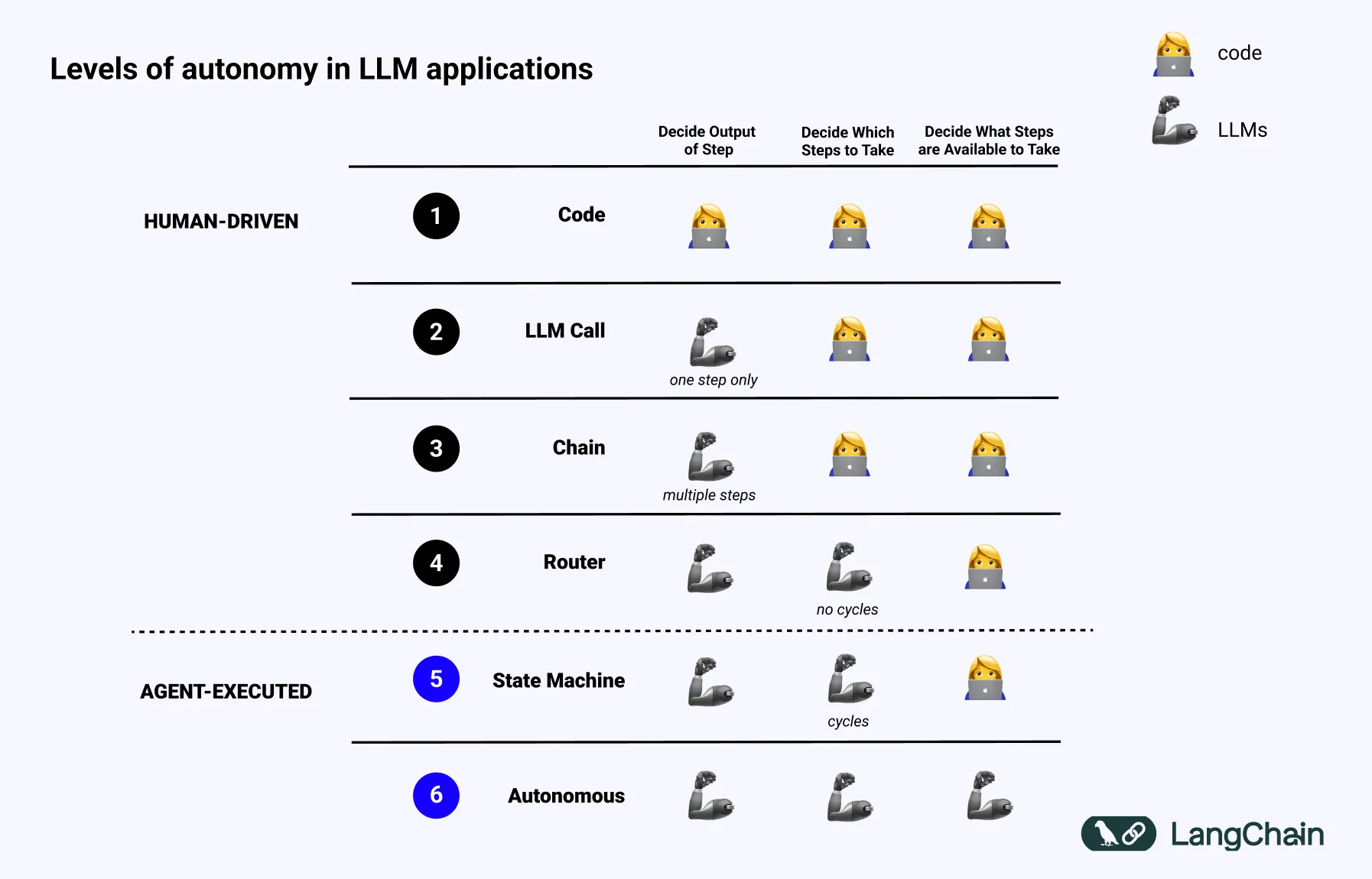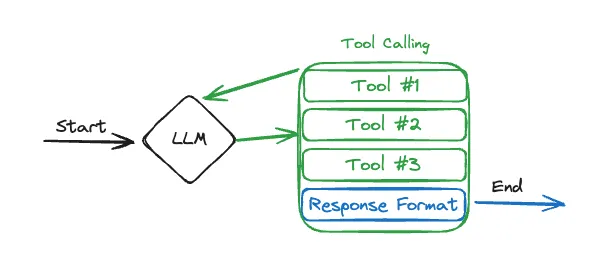Everyone argues on the definition of an AI agent - scroll down if you don’t believe me.
Some people say that AI agents need to act autonomously. Others say AI agents need to reason about their environment based on inputs and their own outputs. While others say that AI agents are systems where an LLM is prompted more than once before returning to the user.
There is no agreed definition because it’s hard to define exactly what an AI agent is.
Note: People use the term AI agent with LLM agent interchangeably. Same with agentic workflows with multi-system agents.
Table of Contents
Open Table of Contents
General definitions of (AI) agents and agentic workflows
Agents are computer programmes that act for users or programmes in a relationship of agency.
AI agents are systems that can understand their environment, make decisions, and take actions to achieve specific goals.
Agentic workflows are a more complex system where many AI agents collaborate to complete tasks.
Side note: Agents are not a new concept. Before the rise of LLMs, agents helped automate tasks through hardcoded algorithms. These will continue to exist. An agent doesn’t need an LLM if the task does not require it.
Some differing definitions of AI agents
Here are some definitions of AI agents, see appendix for more definitions.
| Source | Definition |
|---|---|
| AWS | An artificial intelligence (AI) agent is a software program that can interact with its environment, collect data, and use the data to perform self-determined tasks to meet predetermined goals. |
| LlamaIndex | An “agent” is an automated reasoning and decision engine. It takes in a user input/query and can make internal decisions for executing that query in order to return the correct result. |
| Microsoft | Unlike standalone large language models (LLMs) or rule-based software/hardware systems, AI agents have these common features: - Planning: AI agents can plan and sequence actions to achieve specific goals. The integration of LLMs has revolutionized their planning capabilities. - Tool usage: Advanced AI agents can use various tools, such as code execution, search, and computation capabilities, to perform tasks effectively. AI agents often use tools through function calling. - Perception: AI agents can perceive and process information from their environment, to make them more interactive and context aware. This information includes visual, auditory, and other sensory data. - Memory: AI agents have the ability to remember past interactions (tool usage and perception) and behaviors (tool usage and planning). They store these experiences and even perform self-reflection to inform future actions. |
All of these definitions are correct to some degree, none are egregious. Take the last definition for example, these are common AI agent design patterns. The issue, however, is when the an AI agent system implements some of these design patterns but not all. What do we do then?
Andrew Ng to the rescue - they’re all agentic, just at differing levels 🤷
Andrew Ng tweeted that we should stop discussing whether things are AI agents or not. Instead, we should agree that different systems can be agentic to different degrees. Similarly, autonomous vehicles have levels of autonomy, we can also view AI agent capabilities as a range.
An AI completing a task autonomously is agentic. An AI researching a topic and summarising it is agentic.

It's agentic meme from Andrew Ng
My favourite technical definition of an AI agent
LangChain’s Harrison Chase had a contrarian definition:
An AI agent is a system that uses an LLM to decide the control flow of an application.
I like this succinct definition as it covers a wide range of use cases, such as a simple routing system.
This visual provides a useful framing to think about different levels of autonomy in LLM applications. I find the separation between human-driven and agent-driven execution useful.

Levels of LLM autonomy from Harrison's TED talk
A system is more “agentic” the more control an LLM has in a system.
Example use cases for this framework:
- A
Routeris an LLM that routes inputs into a certain downstream workflow. - A
State Machineis when an LLM decides whether to continue a task in a loop or decide it has been completed. - A system with many LLMs deciding many routing steps would lie between
RouterandState Machine. - An
Autonomous Agentincludes systems that can build tools, remember them, and use them.

A simple ReAct tool-calling agent from LangChain docs
Why this framing is useful
This agentic concept is useful when developing your own agentic systems. Knowing how agentic your system can help in many ways:
- Guide your decision-making in the development process.
- Determine how sophisticated an orchestration framework is needed.
- Determine how complex and long tasks will take to complete.
- Determine whether you want to be able to interact and observe what is happening between tasks.
- Determine what evaluation framework is necessary.
Understanding the agentic capabilities requirements of your system can improve the efficiency and robustness of your development process.
References
- https://lilianweng.github.io/posts/2023-06-23-agent/
- https://www.deeplearning.ai/the-batch/how-agents-can-improve-llm-performance/
- https://blog.langchain.dev/what-is-an-agent/
- https://en.wikipedia.org/wiki/Software_agent
Appendix: More definitions
| Source | Definition |
|---|---|
| Zapier | An AI agent is an entity that can act autonomously in an environment. It can take information from its surroundings, make decisions based on that data, and act to transform those circumstances—physical, digital, or mixed. More advanced systems can learn and update their behavior over time, constantly trying out new solutions to a problem until they achieve the goal. |
| SalesForce | AI agents are a type of artificial intelligence (AI) system that can understand and respond to customer inquiries without human intervention. They are created using an agent builder, like Agentforce, and rely on machine learning and natural language processing (NLP) to handle a wide range of tasks. These intelligent agents can include anything from answering simple questions to resolving complex issues — even multi-tasking. Most importantly, AI agents can continuously improve their own performance through self-learning. This is distinct from traditional AI, which requires human input for specific tasks. |
| Glean | AI agents are systems that can perform tasks autonomously by interpreting data from the environment, making decisions based on that data, and executing actions to achieve set goals. They operate under predefined algorithms and machine learning models that enable them to learn and adapt over time. |
| CrewAI | An agent is an autonomous unit programmed to: - Perform tasks - Make decisions - Communicate with other agents |
| Github | Agentic AI refers to artificial intelligence capable of making decisions, planning, and adapting to new information in real time. AI agents learn and enhance their performance through feedback, utilizing advanced algorithms and sensory inputs to execute tasks and engage with their environments. |
| Oracle | AI agents are software entities that can be assigned tasks, examine their environments, take actions as prescribed by their roles, and adjust based on their experiences. |